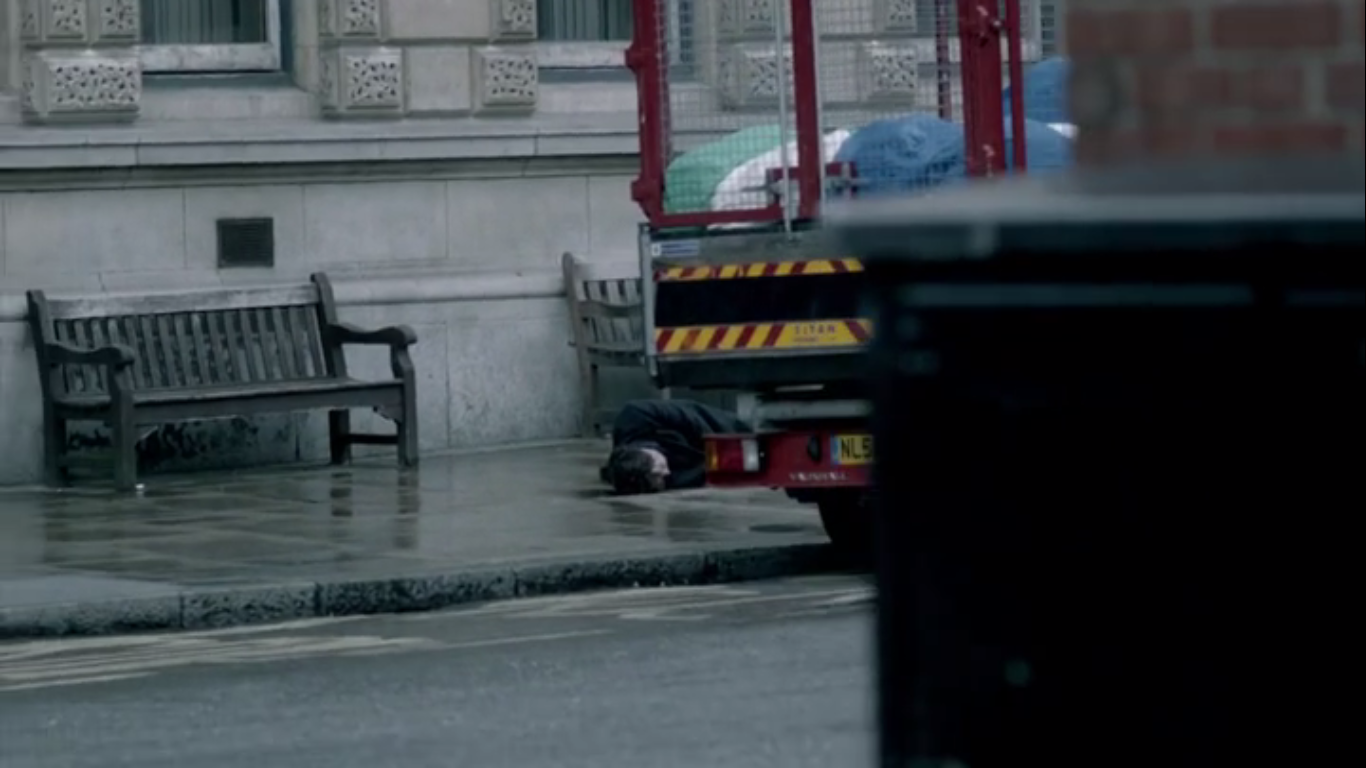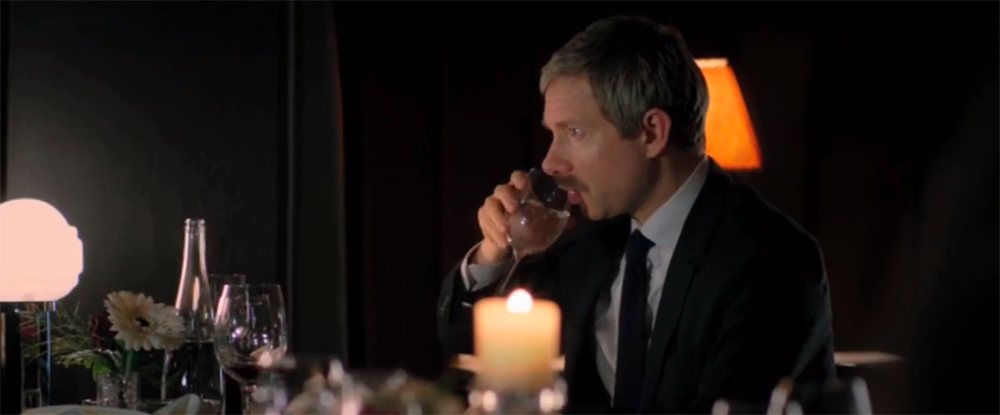On January 1st the British re-interpration of Sir Arthur Conan Doyle’s Sherlock Holmes will return in the form of the third Season of BBC’s Sherlock. Starring Benedict Cumberbatch (Star Trek Into Darkness, The Hobbit) as the title giving detective and Martin Freeman (The Hobbit, Ali G. Inda House (yes, check it out just to see Freeman as a gangsta!)) as Dr. John Watson. And after the cliffhanger from Season 2 featuring a confrontation between Sherlock and his archenemy Jim Moriarty (Andrew Scott) we had to wait 2 years to find out what happened in these final moments.
This essay will contain spoilers for Season 1-2 of Sherlock and will go into the depths of my fears for Season 3:
Why I hated the ending of Season 2 and dread Season 3
I watched Sherlock pretty much in one sitting. I had no idea about the series aside from the fact that everyone who had watched it highly recommended it. So when the final episode of Season 2 came around I had no idea that there would be a third Season.
That’s the thing I love about British TV. It is short and to the point. Ricky Gervais’s show The Office consists of 2 seasons with 6 episodes each. Compare that to the American Office with 201 episodes. And because of this I was entirely prepared that Sherlock might end after “only” 6 episodes.
So as the final moments of The Reichenbach Fall (S02E03) approached and it was one of the best 1.5 hours I have seen in recent years. The writing, the acting, the suspense… everything was top notch.
As Watson and Sherlock shared their final (?) phonecall I was in awe: could a series be this bold and draw the line? End at the peak of the series with a villain who has a plan that shames almost every comic book movie in existence (see my trashing of Iron Man 2) and doing something nobody expects: killing off both villain and hero as neither wants to give their enemy the upper hand. Ending the series in the tragic irony that Sherlock has lived but we would have never believed it because the tabloids have “proven” that he was a fraud.
It is bittersweet – and very British – to acknowledge the miracle of this wondrous mind while also showing that the public would have never believed such a thing (many parallels to The Prestige, a movie that I really enjoy pondering about).
So as I was in tears and awe at the magnificent finale the last seconds showing Sherlock alive really crushed the entire drama and turned a completely self-contained ballsy ending into just another fake-death.
Bottom line my fears and aversion to the new Season stem not from the fact that I don’t want to see Sherlock return. It is my fear that whatever happens after this magnificent finale will always remain in the shadow of it.
So best case: Season 3 just blows everything away and I swallow my fears and just accept the return of Sherlock Holmes as a mean to deliver more great stories.
So as millions of other fans I started to return to The Reichenbach Fall to look for clues how Sherlock might have done it. And the more I thought about it the more two questions/problems crystalized that in my mind need to be addressed.
The theories all revolve around John Watson
You can find many theories speculating about Sherlock’s return some ranging from plausible (Sherlock jumping upon a truck that dampens his fall before falling onto the ground) to super crazy (a cyclist injecting Watson with the H.O.U.N.D. serum and everything afterwards being a hallucination).
Yet they all seem to share one idea:
They are all constructed to fool John Watson.
- Sherlock orders John to stay exactly where he is.
- To keep his eyes fixed onto the falling Sherlock.
- There is a building blocking John’s line of sight.
- The cyclist knocks down John so that whatever trickery is happening can be happening before John arrives there…
And all the time I am thinking: what if Moriarty had not killed himself and just stood up there looking down? All the theories are about how Sherlock tricked Watson but they all assume Moriarty is already dead. Many theories depend on Watson not seeing the direct fall because of where he stands – but if the fall is masked by the building then Moriarty could have seen every bit of trickery. Watson might have believed the death but Moriarty wouldn’t and the entire plan would have fallen apart.
Unless Sherlock somehow anticipated Moriarty’s death – meaning he planned every detail in advance no matter how unlikely it was. Which leads us to a stereotype that keeps plaguing stories for quite a while now:
Batman always has a plan and the loss of emotion
There is a running gag among comic fans: if the question arises whether Batman could take down another hero/villain the question always is: “does Batman have time to prepare?”
Because Batman has a plan for everything and even his backup plans have backup plans.

While this is a funny gag it can easily turn into a trite and boring cliché in the hands of a bad writer. In recent Hollywood movies there has been this obsession with a complex plan that the villain is pursuing. The Joker in The Dark Knight has plans after plans after plans –an idea that works since he is pitted against a hero who also plans everything.
But imitators are not far away and now every time the hero seems to win (i.e. capture the villain) the villain seemed to have pre-planned all this and then some to turn the tables.
Generally one can distinguish between two types of tacticians in movies:
- The one who is smart and can always use the situation for his own advantage.
- The one who always plans everything beforehand because the screenplay says so.
The second one is really starting to get on my nerves because many times it depends on some highly unlikely predictions whereas the first one is genuinely exciting and much more believable.

I recently re-read Timothy Zahn’s Star Wars stories about a brilliant general named Thrawn who almost defeats the heroes. Thrawn is such a brilliant character because he plans a lot but also because he can use any situation to his advantage. Even when he is defeated he sees away to avert complete disaster and this is what makes him so threatening: The reader knows that he will return and won’t repeat the same mistake. Thrawn is smart, charismatic but above all relatable.
This aspect of a character being able to exploit a situation that is initially against him makes for the best possible suspense since we don’t expect it to happen. The audience is already on board with one thing when the character reveals a way out and turns the table.
Because of this very table-turning effect I was on the edge of my seat during the finale of Sherlock. We had two characters with massive egos who would not back down. Even when it seemed as if Moriarty had one Sherlock found a loophole and even then Moriarty found a way to screw with Sherlock. It was like an intellectual fight where both parties had been bruised and stood there bloody but refusing to let the other player win.
It is because of this that Moriarty’s suicide is so absolutely perfect. It is the ultimate way to spite the hero. Instead of keeping Moriarty around for Seasons which would eventually diminish the character the authors let Moriarty go out in a way little to nobody would have expected.
As Sherlock stands mortified looking at the body of his enemy there seems to be no way out. He has defeated the villain but the villain has also defeated him. In a beautiful symmetry both hero and villain die willingly to smash the plan of their nemesis. The difference is that Moriarty is doing it out of egoism whereas Sherlock dies because he cares about his friends.
Aaaaaand Sherlock is alive again.
Which pretty much turns a scene about two tacticians of the first type into a scene with a tactician of the second type. Sherlock somehow planned all this to fake his death. His backup plans have backup plans. The extremely emotional scene – the last phonecall to his best friend – is now only half emotional because Sherlock is not really dying. His confession to John is now tainted because it is also a confession to fool his best friend.
The conversation then shifts from the emotional story to the plot machinations that allowed the smartest man on the planet to fake his death in such a convincing matter.
The positive side – turning into Sherlock
The really cool thing about this finale is that writer Steven Moffat has turned the audience into Sherlock themselves. And only because of the long gap have we really gone back and looked at the mystery, trying out all different explanation and like Sherlock wanting to solve a seemingly unsolvable mystery. Now I don’t expect a mindblowing finale and I take Moffat’s comments about fans having missed the vital clue with a grain of salt (because that is what J.K. Rowling said about Potter and the fans pretty much guessed all the major twists) but I remain optimistic.
I can cry on and on about how I would have preferred a different outcome of the series but I would be on a very small ground surrounded by people shouting at me for not getting more Sherlock. And maybe – just maybe – the third series will blow us away and I will laugh at myself for being stupid enough to wish Sherlock had ended.
And if all goes wrong I can still go back pretending that Sherlock ended after Season 2.
P.S.: The only way for the plan to work with Moriarty that I can think of is that Sherlock tried to deceive Moriarty in the moment when he asked for a moment of privacy. The moment Moriarty turned away is the only moment where Sherlock could have jumped and faked everything… but still that would leave a window of about 5 seconds until Moriarty would look down onto the scene so it is possible but the plan would need to work very hard… plus it would have looked very comical when Moriarty turned away and Sherlock just jumped…. just saying.
P.P.S.: Have you checked out the 7 minute webisode for the new Season?
Sherlock will return on January 1st!






Schreibe den ersten Kommentar